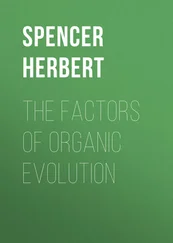Such, then, is a general outline of the evidence which justifies the comparison of societies to living organisms. That they gradually increase in mass; that they become little by little more complex; that at the same time their parts grow more mutually dependent; and that they continue to live and grow as wholes, while successive generations of their units appear and disappear; are broad peculiarities which bodies-politic display in common with all living bodies; and in which they and living bodies differ from everything else. And on carrying out the comparison in detail, we find that these major analogies involve many minor analogies, far closer than might have been expected. Others might be added. We had hoped to say something respecting the different types of social organization, and something also on social metamorphoses; but we have reached our assigned limits.
[28]It may be well to warn the reader against an error fallen into by one who criticised this essay on its first publication—the error of supposing that the analogy here intended to be drawn, is a specific analogy between the organization of society in England, and the human organization. As said at the outset, no such specific analogy exists. The above parallel is one between the most-developed systems of governmental organization, individual and social; and the vertebrate type is instanced merely as exhibiting this most-developed system. If any specific comparison were made, which it cannot rationally be, it would be made with some much lower vertebrate form than the human.
THE ORIGIN OF ANIMAL WORSHIP.
Table of Contents
[ First published in The Fortnightly Review for May, 1870.]
Mr. McLennan's recent essays on the Worship of Animals and Plants have done much to elucidate a very obscure subject. By pursuing in this case, as before in another case, the truly scientific method of comparing the phenomena presented by existing uncivilized races with those which the traditions of civilized races present, he has rendered both of them more comprehensible than they were before.
It seems to me, however, that Mr. McLennan gives but an indefinite answer to the essential question—How did the worship of animals and plants arise? Indeed, in his concluding paper, he expressly leaves this problem unsolved; saying that his "is not an hypothesis explanatory of the origin of Totemism , be it remembered, but an hypothesis explanatory of the animal and plant worship of the ancient nations." So that we have still to ask—Why have savage tribes so generally taken animals and plants and other things as totems? What can have induced this tribe to ascribe special sacredness to one creature, and that tribe to another? And if to these questions the reply is, that each tribe considers itself to be descended from the object of its reverence, then there presses for answer the further question—How came so strange a notion into existence? If this notion occurred in one case only, we might set it down to some whim of thought or some illusive occurrence. But appealing, as it does, with multitudinous variations among so many uncivilized races in different parts of the world, and having left numerous marks in the superstitions of extinct civilized races, we cannot assume any special or exceptional cause. Moreover, the general cause, whatever it may be, must be such as does not negative an aboriginal intelligence like in nature to our own. After studying the grotesque beliefs of savages, we are apt to suppose that their reason is not as our reason. But this supposition is inadmissible. Given the amount of knowledge which primitive men possess, and given the imperfect verbal symbols used by them in speech and thought, and the conclusions they habitually reach will be those that are relatively the most rational. This must be our postulate; and, setting out with this postulate, we have to ask how primitive men came so generally, if not universally, to believe themselves the progeny of animals or plants or inanimate bodies. There is, I believe, a satisfactory answer.
The proposition with which Mr. McLennan sets out, that totem-worship preceded the worship of anthropomorphic gods, is one to which I can yield but a qualified assent. It is true in a sense, but not wholly true. If the words "gods" and "worship" carry with them their ordinary definite meanings, the statement is true; but if their meanings are widened so as to comprehend those earliest vague notions out of which the definite ideas of gods and worship are evolved, I think it is not true. The rudimentary form of all religion is the propitiation of dead ancestors, who are supposed to be still existing, and to be capable of working good or evil to their descendants. As a preparation for dealing hereafter with the principles of sociology, I have, for some years past, directed much attention to the modes of thought current in the simpler human societies; and evidence of many kinds, furnished by all varieties of uncivilized men, has forced on me a conclusion harmonizing with that lately expressed in this Review by Prof. Huxley—namely, that the savage, conceiving a corpse to be deserted by the active personality who dwelt in it, conceives this active personality to be still existing, and that his feelings and ideas concerning it form the basis of his superstitions. Everywhere we find expressed Or implied the belief that each person is double; and that when he dies, his other self, whether remaining near at hand or gone far away, may return, and continues capable of injuring his enemies and aiding his friends. [29]
But how out of the desire to propitiate this second personality of a deceased man (the words "ghost" and "spirit" are somewhat misleading, since the savage believes that the second personality reappears in a form equally tangible with the first), does there grow up the worship of animals, plants, and inanimate objects? Very simply. Savages habitually distinguish individuals by names that are either directly suggestive of some personal trait or fact of personal history, or else express an observed community of character with some well-known object. Such a genesis of individual names, before surnames have arisen, is inevitable; and how easily it arises we shall see on remembering that it still goes on in its original form, even when no longer needful. I do not refer only to the significant fact that in some parts of England, as in the nail-making districts, nicknames are general, and surnames little recognized; but I refer to a common usage among both children and adults. The rude man is apt to be known as "a bear;" a sly fellow, as "an old fox;" a hypocrite, as "the crocodile." Names of plants, too, are used; as when the red-haired boy is called "carrots" by his school-fellows. Nor do we lack nicknames derived from inorganic objects and agents: instance that given by Mr. Carlyle to the elder Sterling—"Captain Whirlwind." Now, in the earliest savage state, this metaphorical naming will in most cases commence afresh in each generation—must do so, indeed, until surnames of some kind have been established. I say in most cases, because there will occur exceptions in the cases of men who have distinguished themselves. If "the Wolf," proving famous in fight, becomes a terror to neighbouring tribes, and a dominant man in his own, his sons, proud of their parentage, will not let fall the fact that they descended from "the Wolf"; nor will this fact be forgotten by the rest of the tribe who hold "the Wolf" in awe, and see reason to dread his sons. In proportion to the power and celebrity of "the Wolf" will this pride and this fear conspire to maintain among his grandchildren and great-grandchildren, as well as among those over whom they dominate, the remembrance of the fact that their ancestor was "the Wolf". And if, as will occasionally happen, this dominant family becomes the root of a new tribe, the members of this tribe will become known to themselves and others as "the Wolves".
Читать дальше












